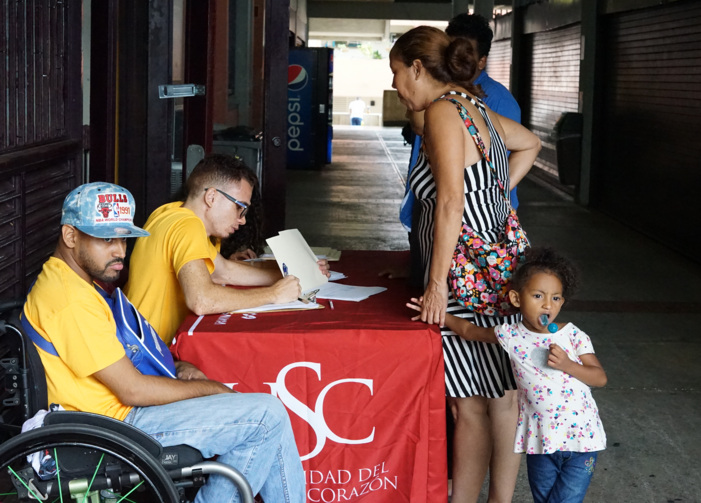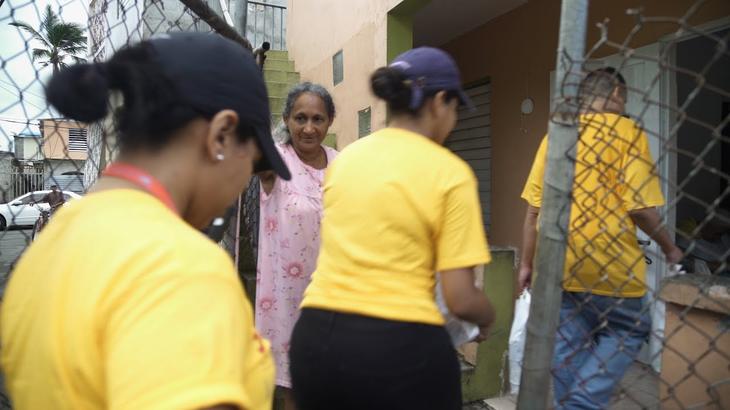Hurricane Maria destroyed countless houses in Playita, a poor neighborhood in San Juan, Puerto Rico. The Category 4 hurricane hit the island on Sept. 20, but more than half of its inhabitants are still living without electricity.
“We were flooded by black water. Thank God we’re alive,” says José Sánchez, standing in front of his damaged home. “It was horrible. Everything fell apart.”
None of the homes in this part of the city have electricity and some still do not have running water. Wind ripped roofs off many of the houses.
“We were flooded by black water. Thank God we’re alive,” says José Sánchez, standing in front of his damaged home.
Residents have stacked tin roofs, plywood walls and wire throughout the neighborhood. Streetlights dangle from posts by a wire.
Mr. Sánchez holds packages of food and toiletries students from Universidad del Sagrado Corazón (Sacred Heart University) had just dropped off.
Louis Torres, who used to live in the states, stands in front of his two-story house. He stares at mattresses, a couch and other destroyed furniture.
“I lost everything,” he says. “Water filled my house, up to my knees.”
He asked the Sagrado Corazón students for help, but they explained they distribute the food based on a list. This is just one of 52 towns across the 3,500-square-mile island where the Catholic university is providing aid. According to the university’s president, Gilberto J. Marxuach Torrós, they have reached more than 30,000 Puerto Ricans.
“The hurricane has laid bare all the inequalities and social injustices of the island.”
“The hurricane has laid bare all the inequalities and social injustices of the island,” he says. “It’s held up a mirror to us in a way that nothing else has in a long time. It has challenged us to build a new and different Puerto Rico.”
A few days after the hurricane, Mr. Marxuach Torrós accompanied a group of nursing students to Rio Grande, a northeastern coastal community of 50,000. There, while the team assessed medical needs, he unexpectedly met a young woman who attends Sagrado Corazón. The student, her younger sister and her parents fled to a shelter as floodwaters rose up to their shoulders the night of the hurricane.
“They were sleeping on the floor. They had no possessions,” Mr. Marxuach Torrós says. He shared the student’s story with others at the university. They collected a care package and delivered it to the family the next day. The university even worked out a way for the student to continue her studies remotely.
“Our faith informs everything we do at this university.”
“Our faith informs everything we do at this university,” Mr. Marxuach Torrós says. “We believe that every human being is created in the image of God and must be treated with respect. That principle inspires everything we do.”
The university has a “robust service-learning program,” he says. The school’s community contacts, which give students real-life experience, have helped the university reach out to people in need even more after the hurricane. Journalism, communications, nursing, psychology—students from all majors are finding ways to take part in the effort.
“Being a Catholic university, we have contacts throughout the communities,” says Edwin Figueroa, who coordinates pastoral projects for Sagrado Corazón. He explains that they have worked hand-in-hand with community leaders who are more knowledgeable about neighborhood needs.
Students “have lifted up this whole university, challenging us to go out to the margins, like Pope Francis asks.”
Part of the university’s Solidarity Center includes legal experts who help residents navigate the Federal Emergency Management Agency. The university also offers employment assistance and support for small businesses.
“We have been focusing on meeting emergency needs. But the next step is to truly develop the human person,” Mr. Figueroa says, noting the high poverty rates on the island. Most of the students come from low- to low-middle income families, and many have lost their jobs after the hurricane.
Students prepare and distribute bags of water and food soon after the support arrives at the university. The school is accepting donations, from basic goods like water, food and clothing to financial support for their students.
The university, in a joint effort with New York University and the University of Cincinnati, is offering free online courses for any university student affected by Hurricane Maria. The Spanish-language classes began Nov. 4. More than 20 professors from Harvard, N.Y.U. and Wesleyan University, among others, are donating their time for the six-week, three-credit courses.
Mr. Marxuach Torrós says the students “have lifted up this whole university, challenging us to go out to the margins, like Pope Francis asks. The experience of [Hurricane] Maria has transformed these young men and women. The society they will build will be a much better one that the one we built for them.”











